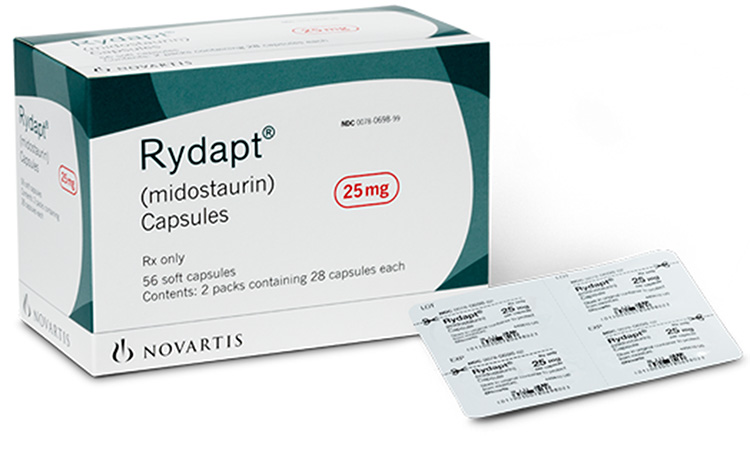Rydapt (midostaurin) vs Vanflyta (quizartinib)
Rydapt (midostaurin) vs Vanflyta (quizartinib)
Rydapt (midostaurin) and Vanflyta (quizartinib) are both targeted therapies used to treat certain types of acute myeloid leukemia (AML). Rydapt is approved for use in newly diagnosed AML patients who have a specific genetic mutation called FLT3, in combination with standard chemotherapy, and has also shown efficacy in treating advanced systemic mastocytosis. In contrast, Vanflyta is specifically designed for the treatment of adult patients with relapsed or refractory AML that is FLT3-ITD positive, offering an option for those who may not have responded to other treatments or whose disease has returned. It is important for patients to discuss with their healthcare provider which medication is most suitable for their specific medical condition, considering factors such as the stage and genetic characteristics of their AML, previous treatments, and overall health status.
Difference between Rydapt and Vanflyta
| Metric | Rydapt (midostaurin) | Vanflyta (quizartinib) |
|---|---|---|
| Generic name | Midostaurin | Quizartinib |
| Indications | Newly diagnosed acute myeloid leukemia (AML) that is FLT3 mutation-positive, aggressive systemic mastocytosis, systemic mastocytosis with associated hematological neoplasm, or mast cell leukemia | Relapsed or refractory acute myeloid leukemia (AML) with FLT3-ITD mutations |
| Mechanism of action | Protein kinase inhibitor that targets multiple receptor tyrosine kinases, including FLT3 | Selective inhibitor of the FLT3 tyrosine kinase |
| Brand names | Rydapt | Vanflyta |
| Administrative route | Oral | Oral |
| Side effects | Febrile neutropenia, nausea, mucositis, vomiting, headache, petechiae, musculoskeletal pain | QT interval prolongation, nausea, thrombocytopenia, diarrhea, fatigue, musculoskeletal pain |
| Contraindications | Hypersensitivity to midostaurin or any of its excipients | Hypersensitivity to quizartinib or any of its excipients |
| Drug class | Multi-kinase inhibitor | Tyrosine kinase inhibitor |
| Manufacturer | Novartis Pharmaceuticals Corporation | Daiichi Sankyo Company, Limited |
Efficacy
Rydapt (Midostaurin) Efficacy in Leukemia
Rydapt, known generically as midostaurin, is a medication that has shown efficacy in treating certain types of leukemia. Specifically, it has been approved for use in adult patients with newly diagnosed acute myeloid leukemia (AML) that is FLT3 mutation-positive, as detected by an FDA-approved test. Midostaurin is used in combination with standard chemotherapy. Clinical trials have demonstrated that midostaurin, when added to standard chemotherapy, can lead to a significant improvement in overall survival rates compared to chemotherapy alone. The RATIFY trial, a large international phase III study, showed that patients receiving midostaurin had a median overall survival of 74.7 months compared to 25.6 months for those who received placebo.
Midostaurin works by inhibiting multiple receptor tyrosine kinases, including FLT3, which is mutated and constitutively active in a subset of AML patients. By targeting FLT3, midostaurin can help to inhibit the growth of leukemia cells. It is important to note that the efficacy of midostaurin is closely tied to the presence of the FLT3 mutation; therefore, testing for this mutation is critical before initiating treatment with Rydapt.
Vanflyta (Quizartinib) Efficacy in Leukemia
Vanflyta, with the generic name quizartinib, is another targeted therapy that has been investigated for its efficacy in treating AML, particularly in patients with the FLT3-ITD (internal tandem duplication) mutation. Quizartinib is a potent and selective FLT3 inhibitor. Although as of the knowledge cutoff date, quizartinib has not been approved by the FDA for use in the United States, it has been granted approval in Japan for the treatment of FLT3-ITD positive relapsed or refractory AML patients. Clinical trials have shown that quizartinib can lead to significant responses in this patient population, with one phase III trial (QuANTUM-R) demonstrating that quizartinib monotherapy resulted in a median overall survival of 6.2 months compared to 4.7 months for salvage chemotherapy.
The efficacy of quizartinib in clinical trials highlights its potential as a treatment option for patients with FLT3-ITD AML. The selective inhibition of FLT3 by quizartinib can reduce the proliferation of leukemia cells and induce apoptosis. However, the development of resistance to quizartinib and the occurrence of treatment-emergent adverse events are important considerations in its clinical use. As with midostaurin, the presence of the FLT3-ITD mutation is crucial for the efficacy of quizartinib, underscoring the importance of molecular diagnostics in the management of AML.
Regulatory Agency Approvals
Rydapt
-
European Medical Agency (EMA), European Union

-
Food and Drug Administration (FDA), USA

-
Health Canada

-
Therapeutic Goods Administration (TGA), Australia

-
Medsafe (NZ)

Vanflyta
-
European Medical Agency (EMA), European Union

-
Food and Drug Administration (FDA), USA

Access Rydapt or Vanflyta today
If Rydapt or Vanflyta are not approved or available in your country (e.g. due to supply issues), you can access them via Everyone.org.
How it works

Make an enquiry
Choose the medicine you want to buy, answer a couple of questions, and upload your prescription to speed things up. We’ll get back to you within 24 hours.


Make an enquiry
Choose the medicine you want to buy, answer a couple of questions, and upload your prescription to speed things up. We’ll get back to you within 24 hours.


Breeze through the paperwork
We'll guide you through the required documents for importing unapproved medicine, ensuring you have all the necessary information.


Get a personalized quote
We’ll prepare a quote for you, including medicine costs and any shipping, administrative, or import fees that may apply.


Receive your medicine
Accept the quote and we’ll handle the rest - sourcing and safely delivering your medicine.

Some text on this page has been automatically generated. Speak to your physician before you start a new treatment or medication.
Let's talk
If you have any questions, call us or send us a message through WhatsApp or email:
Contact us




